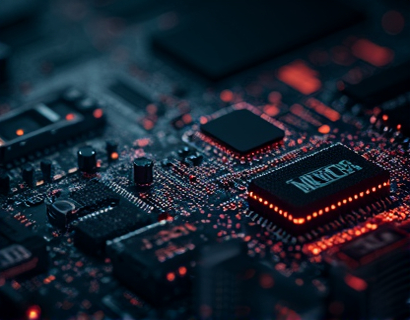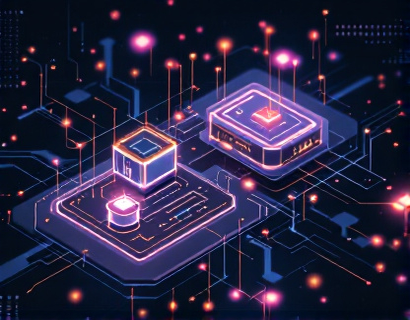Elevating Digital Productivity with Crypto and AI: A Comprehensive Guide
The intersection of cryptocurrency and artificial intelligence (AI) is revolutionizing the digital landscape, offering unprecedented opportunities for enhancing productivity and engagement. This article delves into the latest tools and applications that leverage the power of these technologies, providing a comprehensive guide for tech professionals and enthusiasts. By understanding and utilizing these advanced digital solutions, individuals can significantly boost their efficiency and stay ahead in the rapidly evolving tech world.
Understanding the Synergy Between Crypto and AI
The fusion of cryptocurrency and AI creates a synergy that amplifies the capabilities of both fields. Cryptocurrency, with its decentralized and secure nature, provides a robust foundation for building trust and ensuring transparency in AI-driven applications. AI, on the other hand, brings intelligent automation and data-driven insights, which are essential for optimizing processes and enhancing user experiences. Together, they form a powerful combination that can transform various aspects of digital life.
Enhancing Security with Blockchain Technology
One of the key advantages of using cryptocurrency in AI applications is the enhanced security provided by blockchain technology. Blockchain's decentralized ledger ensures that data is immutable and tamper-proof, which is crucial for AI systems that handle sensitive information. This security feature is particularly important in industries such as finance, healthcare, and supply chain management, where data integrity is paramount. By integrating blockchain, AI applications can operate with greater trust and reliability.
Smart Contracts for Automated Processes
Smart contracts, a core feature of blockchain technology, enable the automation of complex processes without the need for intermediaries. In the context of AI, smart contracts can be used to execute tasks based on predefined conditions, ensuring that processes are executed efficiently and accurately. For instance, in supply chain management, smart contracts can automate payments and inventory updates, reducing delays and errors. This level of automation not only saves time but also reduces operational costs.
AI-Driven Cryptocurrency Trading Platforms
The integration of AI in cryptocurrency trading has led to the development of sophisticated trading platforms that can analyze vast amounts of data in real-time. These platforms use machine learning algorithms to identify patterns, predict market trends, and execute trades with minimal human intervention. For traders and investors, this means increased accuracy and faster decision-making, leading to higher returns and reduced risk. AI-driven trading platforms are becoming increasingly popular among tech-savvy individuals looking to capitalize on the crypto market.
Personalized User Experiences through AI
AI technologies such as natural language processing (NLP) and machine learning can be used to create highly personalized user experiences. In the realm of digital applications, AI can analyze user behavior and preferences to tailor content and recommendations. For example, a news aggregator powered by AI can curate articles based on a user's reading history and interests, providing a more relevant and engaging experience. This level of personalization not only enhances user satisfaction but also increases engagement and retention.
Optimizing Content Creation with AI
Content creation is a critical aspect of digital marketing, and AI can significantly streamline this process. AI-powered tools can generate high-quality content, from blog posts to social media updates, saving time and resources. These tools use natural language generation (NLG) to produce coherent and contextually relevant content. Additionally, AI can assist in content optimization by analyzing keywords, SEO best practices, and audience preferences, ensuring that the content reaches the right people and performs well in search engines.
Enhancing Customer Support with Chatbots
Chatbots, powered by AI, have become an essential tool for providing instant and efficient customer support. These virtual assistants can handle a wide range of queries, from basic FAQs to complex issues, 24/7. By using natural language understanding (NLU), chatbots can interpret user requests and provide accurate responses, improving customer satisfaction and reducing the workload on human support teams. In the context of cryptocurrency and financial services, chatbots can offer real-time assistance with transactions, account management, and investment advice.
Data Analytics and Insights with AI
AI-driven data analytics tools can process and analyze large datasets to uncover valuable insights. For businesses and organizations, these insights can inform strategic decisions, optimize operations, and drive innovation. In the crypto space, AI can analyze market data, transaction patterns, and user behavior to identify trends and opportunities. This data-driven approach enables more informed and strategic decision-making, leading to better outcomes and increased competitiveness.
Decentralized Applications (DApps) for Enhanced Engagement
Decentralized applications (DApps) are a prime example of how cryptocurrency and AI can work together to create engaging and interactive digital experiences. DApps operate on blockchain networks, offering users greater control and security. By integrating AI, DApps can provide personalized experiences, intelligent recommendations, and automated processes. For instance, a gaming DApp can use AI to adapt game difficulty based on a player's skill level, ensuring an enjoyable and challenging experience.
Building Trust with Transparency
Transparency is a fundamental aspect of blockchain technology, and it plays a crucial role in building trust in AI applications. By using blockchain, AI systems can provide verifiable and auditable records of their operations, ensuring that users can trust the outcomes and decisions made by these systems. This transparency is particularly important in sectors like healthcare, where patient data privacy and accuracy are of utmost importance. Trustworthy AI applications can lead to broader adoption and more effective implementation.
Challenges and Considerations
While the integration of cryptocurrency and AI offers numerous benefits, there are also challenges and considerations to keep in mind. One of the primary concerns is the regulatory landscape, as both cryptocurrencies and AI are subject to varying regulations across different regions. Compliance with these regulations is essential to avoid legal issues and ensure smooth operations. Additionally, the technical complexity of these technologies requires a skilled workforce, which can be a barrier for some organizations. Investing in training and development is crucial to overcome this challenge.
Future Trends and Innovations
The future of crypto and AI is promising, with several trends and innovations on the horizon. One such trend is the development of more advanced AI models, such as generative adversarial networks (GANs) and transformers, which can further enhance content creation and data analysis. The integration of quantum computing with AI and blockchain could also revolutionize computational capabilities, enabling faster and more complex computations. Additionally, the rise of Web3 and decentralized finance (DeFi) is set to redefine how we interact with digital services, offering more autonomy and control to users.
Conclusion
The fusion of cryptocurrency and AI is transforming the digital landscape, offering powerful tools and applications that can significantly enhance productivity and engagement. By leveraging the security, automation, and insights provided by these technologies, individuals and organizations can stay ahead in a rapidly changing world. As the field continues to evolve, staying informed and adaptable will be key to harnessing the full potential of crypto and AI-driven solutions.










































